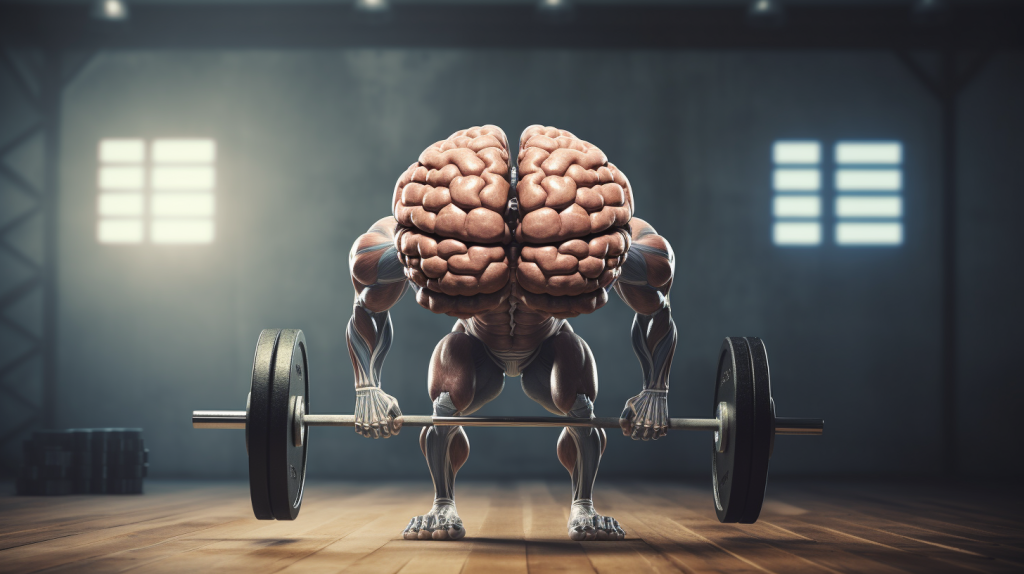Geschatte leestijd: 3 minuten
Nevertheless, I see only benefits in playing with my granddaughter as a lean, muscular grandpa and consider it less likely that I will forget her name. Somewhat helped by the fact that I am a 40-year-old grandpa,
but who’s counting?
References
- H. Pentikäinen, K. Savonen, P. Komulainen, V. Kiviniemi, T. Paajanen, M. Kivipelto, H. Soininen, R. Rauramaa. Muscle strength and cognition in ageing men and women: The DR’s EXTRA study. European Geriatric Medicine, 2017; 8 (3): 275 DOI: 10.1016/j.eurger.2017.04.004
- The relationships between body composition characteristics and cognitive functioning in a population-based sample of older British men
Efstathios PapachristouEmail author, Sheena E. Ramsay, Lucy T. Lennon, Olia Papacosta, Steve Iliffe, Peter H. Whincup and S. Goya Wannamethee.BMC Geriatrics201515:172 DOI: 10.1186/s12877-015-0169-y
Research has shown a positive correlation between muscle strength and cognitive function in older adults.
‘Strength training makes you smarter’
Granted; the title is a rather loose translation of the research results. I naturally seize every opportunity to debunk the stereotype of the dumb musclehead. However, some nuance is warranted here.
Firstly, we’re talking about cognitive function; the brain’s ability to receive, process, store, and use information. Important, of course, but not a complete coverage of the concept of ‘intelligence’. Nevertheless, no one will deny that these are important attributes of a healthy mental capacity.
Moreover, the Finnish study specifically relates to older adults. The findings were published in
European Geriatric Medicine [1]. Not exactly a journal where the average bodybuilder or fitness enthusiast has a subscription.
However, I have previously written about the effect of running on cognitive function in young people. Not entirely comparable, of course, but it shows that training may not only affect by countering damage from aging.
Muscle Strength and Cognitive Function
Researchers from the University of Eastern Finland used data from 338 men and women with an average age of 66 years. They measured muscle strength in three different ways: Handgrip strength, strength of the muscles in the upper body, and strength of the lower body. For this, they had participants perform exercises such as leg extension, leg curls, and leg press for the lower body. For the upper body, strength was tested with exercises such as bench press and seated row.
Firstly, the research showed that measuring only handgrip strength is not enough to investigate certain associations with muscle strength. Testing handgrip strength is easier, requires less effort, and has a lower risk of injury than the mentioned exercises for the lower and upper body. However, in this study, there was no correlation between handgrip strength and cognitive function, whereas there was a correlation between muscle strength of the lower and upper body and cognitive function:
The findings suggest that this may better reflect the association between muscle strength and cognition
Heikki Pentikäinen, University of Eastern Finland.
Strength training for older adults already receives considerable attention and is often recommended to counteract the decline in muscle mass and strength due to aging (sarcopenia). However, the association between muscle strength and cognitive function had not been frequently studied.
However, this research did not demonstrate a causal relationship. Both could be the result of other factors. Therefore, you cannot (unfortunately) conclude yet that by strength training you become stronger and thus improve your cognitive function.
More Body Fat, Higher Risk of Reduced Cognitive Function
Moreover, previous research in older adults has shown that a higher fat percentage increases the risk of severe cognitive function decline in older adults. This is the outcome of British research from 2015 among 1570 participants in the British Regional Heart Study [2].
Furthermore, in this context, the location of body fat was found to play a larger role than the total amount.
‘No Association Between Muscle Mass and Cognitive Function’
The British researchers also looked at the association between muscle strength and cognitive function. They found no association but only tested with handgrip strength, which as now shown is not sufficient.
However, what is interesting about the British study is that they found no association between muscle mass and cognitive function.
Nevertheless, I see only benefits in playing with my granddaughter as a lean, muscular grandpa and consider it less likely that I will forget her name. Somewhat helped by the fact that I am a 40-year-old grandpa,
but who’s counting?
References
- H. Pentikäinen, K. Savonen, P. Komulainen, V. Kiviniemi, T. Paajanen, M. Kivipelto, H. Soininen, R. Rauramaa. Muscle strength and cognition in ageing men and women: The DR’s EXTRA study. European Geriatric Medicine, 2017; 8 (3): 275 DOI: 10.1016/j.eurger.2017.04.004
- The relationships between body composition characteristics and cognitive functioning in a population-based sample of older British men
Efstathios PapachristouEmail author, Sheena E. Ramsay, Lucy T. Lennon, Olia Papacosta, Steve Iliffe, Peter H. Whincup and S. Goya Wannamethee.BMC Geriatrics201515:172 DOI: 10.1186/s12877-015-0169-y

